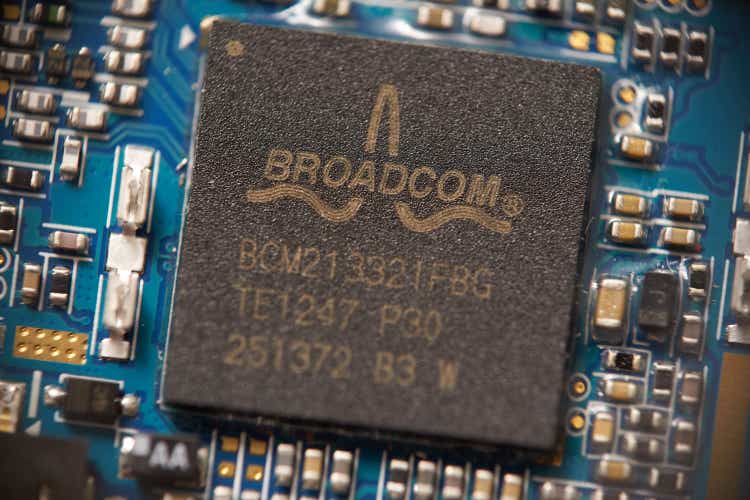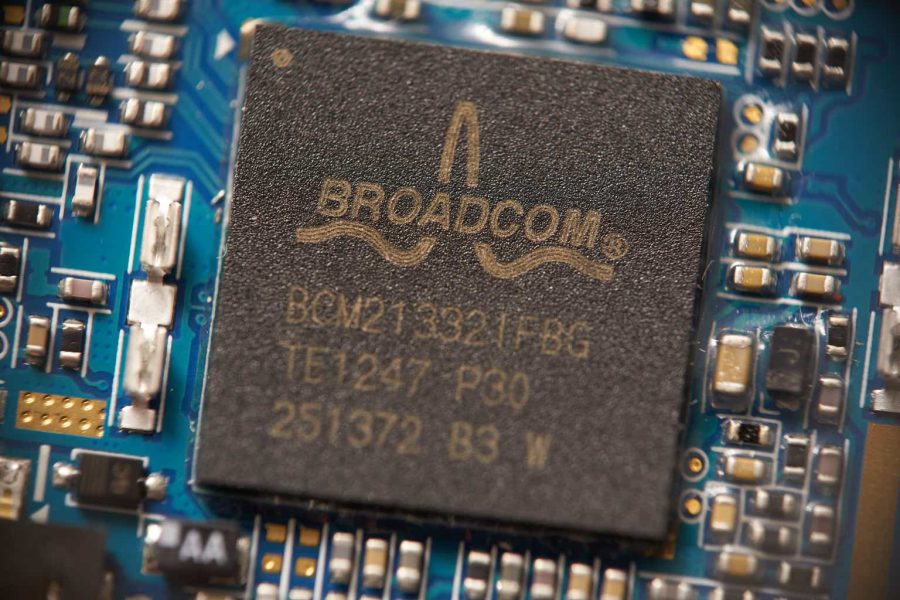Summary:
- Broadcom’s stock appears expensive due to geopolitical risks and potential revenue fluctuations from tensions between the US and China.
- The company relies heavily on revenue from China, which is at risk due to China’s efforts to reduce reliance on foreign chip firms.
- While Broadcom’s acquisition of VMware has boosted revenue, it may not be enough to offset the risks associated with the Chinese market.
G0d4ather
Investment Thesis
I believe that while Broadcom Inc. (NASDAQ:AVGO) has been historically a strong performer within the technology sector, recent headwinds from geopolitical risks make the stock appear expensive in my opinion. With this, investors have to consider the potential for significant revenue fluctuations stemming from heightened geopolitical tensions between the United States and China. I think that investors should also consider looking for signs of expanding its market presence in other regions or adjusting its product mix from semiconductors to software to reduce dependency on any single market and a product line that could face export controls. For now, the stock looks like a sell.
Background
Broadcom is a global chip company that caters to a global customer base, providing advanced chip technologies across multiple industries. The firm specializes in the design, development, and supply of semiconductor and infrastructure software solutions.
Its product offerings include storage adapters and controllers, networking processors, motion control encoders, optical sensors and infrastructure software. This range of software solutions helps secure complex hybrid environments that include cybersecurity measures and tools for managing and optimizing network operations.
Historically, Broadcom has strategically leveraged the Chinese market through one of the largest technology acquisitions when China’s State Administration for Market Regulation (SAMR) approved its takeover of VMware, a deal valued at $61 billion in 2023. This, however, came with restrictive conditions to prevent monopolistic practices and ensure fair competition, particularly in the markets for cloud virtualization software, storage adapters, and Ethernet network cards. For instance, SAMR required that VMware’s server software and Broadcom’s hardware be interoperable with their competitors’ products.
I think that despite the approval of the VMware acquisition, Broadcom is still at risk with their role in the Chinese market. The country’s made in 2025 initiative has meant that the country is trying to reduce its reliance on foreign chip firms, Broadcom potentially included.
China Revenue Is Big For the Company
In the US, the Biden administration has tightened its restrictions on China’s purchase of advanced semiconductors after the Commerce Department announced in October 2023 that it would ban Nvidia and Intel from selling their products in China or even launching new chips to get away with the restrictions. The restrictions also cover Chinese manufacturers’ overseas subsidiaries and 21 other countries.
China, on the other hand, has retaliated by banning the sale of Micron’s chips and adding more restrictions to semiconductor material exports. While the country needs massive amounts of chips to keep its data centers functioning it looks like they are willing to endure some pain as a way to retaliate to Western chip embargoes.
With this, NVIDIA Corporation (NVDA) has since suffered a huge drop in sales in China, falling to a “mid-single digit percentage” of its data center revenue. The firm is still optimistic about its revenues from other markets. Both Intel Corporation (INTC) and Advanced Micro Devices, Inc. (AMD) have also faced direct restrictions by the Chinese government as well. Nvidia’s plans to sell AI chips specifically designed for the Chinese market were thwarted by U.S. regulations, requiring licenses for such exports. Intel, on the other hand, has been banned from using its chips in Chinese government devices.
This wouldn’t even be the first time that Broadcom suffered as a result of Geopolitical tensions with China. In 2019, after the then-Trump administration banned the sale of some chips and components by Broadcom to Huawei (a Chinese smartphone giant) chip revenues dropped in China for Broadcom, causing its stock price to languish.
These restrictions have heightened the demand for alternative suppliers who can pass the stringent regulatory measures and fulfill Chinese product requirements without crossing U.S. export controls. Broadcom continues to derive a significant portion of its revenue from China, which amounted to $11.53 billion in 2023 compared to only $6.98 billion in the United States. I believe this revenue is at risk either from the Chinese government trying to reduce their dependence on them, or the US government banning these chips from being shipped to China.
Valuation
Broadcom’s forward P/E (Non-GAAP) ratio stands at 26.28 based on its Q1 2024 results. This is higher by 14.51% against the sector median of 23.77. Its net income margin (TTM) is at 29.93%, also higher by 1,100.47% compared to the sector median of 2.49%.
The company’s latest quarterly revenue stands at $11.96 billion. The company expects to bring in almost $10 billion in AI revenue through its semiconductor segment in 2024, which has fueled a 10.96% rally in the company’s stock this year. The other (and key) factor powering this growth is their VMware division. Revenue growth is attributed to its acquisition of VMware, which has contributed to the growth in consolidated revenue by 34% YoY to $12 billion (revenue would have only increased by 11% without them).
This puts the company in heavy exposure to the Chinese market. For instance, the Q1 result is not what investors had hoped for despite the growing demand for products that support AI workloads. A survey among chief executives of multinational companies in November 2023 also revealed that they are now less confident about doing business in China with 40% projecting a drop in capital investments and headcount this year.
China remains as one of the largest markets for most American chip manufacturers despite the government’s efforts to prohibit sales. Intel, Nvidia, and AMD continue to find loopholes to navigate restrictions on China, which consumes 50% of global demand for semiconductors. I am confident that sooner or later, the Biden administration will pursue more restrictions to cut off the market for AI semiconductors in China as more companies try to get away with the ban.
As we’ve seen from the past few months, Nvidia’s case now serves as a cautionary tale. Given current TTM China revenue of $11.58 billion, a net income margin of 29.93% and a current forward P/E (Non-GAAP) of 26.28, assuming Broadcom’s sales in China dropped 50% this would result in a decrease in net income by $1.732 billion. If we take this amount of market cap (1.732 × 26.28) this means up to $45.51 billion is shaved off the company’s market cap. This would result in a 7.9% downside in shares alone (this assumes that the remaining net income would continue to be valued at 26.28x and not converge on sector median).
Bull Case: VMware
I think the biggest bull case lies in their massive bet on VMware. There’s no doubt that the company’s high-profile acquisition of VMware was designed to be a transformative bet for Broadcom. This acquisition has contributed to a boost in its revenue, bumping revenue to a YoY growth of 34%. However, even with VMware the company is facing risks that can slow growth.
For example, the company is facing backlash against its decision to lock in customers, impose price hikes and implementation of allegedly “unfair” software licensing terms. This occurred after they acquired VMWare. Broadcom’s CEO Tan clarified the company’s changes in a blog post, but EU cloud providers still remain dissatisfied.
On the other hand, Broadcom’s acquisition of VMWare could result in diversifying revenues. CEO Hock Tan affirmed the company’s decision to “pursue innovation-driven development” in China after meeting Minister of Commerce Wang Wentao. They are trying to work collaboratively with the Chinese government to avoid similar bans to what we saw with Intel and AMD in China.
On their Q1 call, CEO Tan also proclaimed that revenue from VMware will grow by double digits sequentially, quarter-over-quarter, through the rest of the fiscal year.
While management is optimistic about VMware powering future growth I don’t think this is enough to offset the company’s China risk. Trying to fill up to an $11.58 billion revenue gap in the event of a complete China ban would be difficult for most companies. Given this represented about 25% of overall company revenue in 2023, even double-digit growth from VMware cannot offset this. This is why I am bearish. Losses in China revenue could come quickly and unexpectedly. If the company can ramp up future VMware and non-China revenue things may get interesting again.
Bottom Line
While the company has been able to find a partial silver lining in China with their VMware business, I still think Broadcom is a sell until the company stabilizes its operations outside China given its Chinese market exposure. For investors, I recommend closely monitoring developments in U.S.-China relations. Assessing geopolitical risks will help in looking at how Broadcom can align more closely with the broader market dynamics and improve its investment profile.
Its acquisition of VMware is a good strategy to capture the Chinese market, but this makes the stock a high-risk investment until there is more clarity in its Chinese market operations. For now, I rate the stock a sell. If the company can demonstrate they have a plan to not be banned in the Chinese market by the government or face an embargo on Chinese shipments by the US Commerce Department then I am willing to upgrade the stock to a buy.
Analyst’s Disclosure: I/we have a beneficial long position in the shares of AMD either through stock ownership, options, or other derivatives. I wrote this article myself, and it expresses my own opinions. I am not receiving compensation for it (other than from Seeking Alpha). I have no business relationship with any company whose stock is mentioned in this article.
Noah Cox (account author) is the managing partner of Noah’s Arc Capital Management. His views in this article are not necessarily reflective of the firms. Nothing contained in this note is intended as investment advice. It is solely for informational purposes. Invest at your own risk.
Seeking Alpha’s Disclosure: Past performance is no guarantee of future results. No recommendation or advice is being given as to whether any investment is suitable for a particular investor. Any views or opinions expressed above may not reflect those of Seeking Alpha as a whole. Seeking Alpha is not a licensed securities dealer, broker or US investment adviser or investment bank. Our analysts are third party authors that include both professional investors and individual investors who may not be licensed or certified by any institute or regulatory body.
